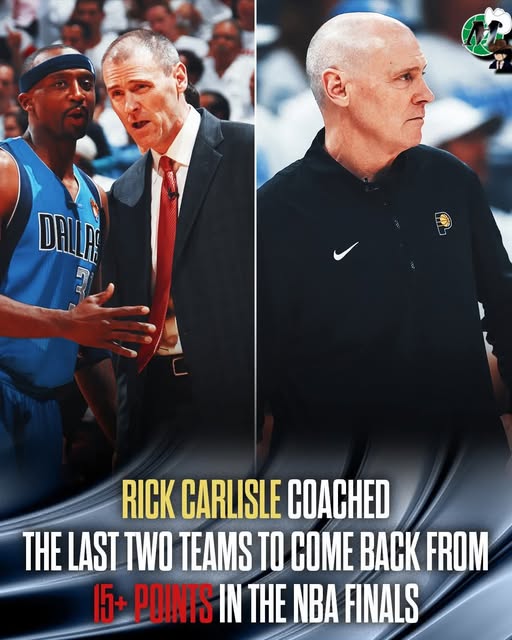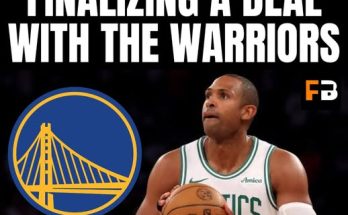Rick Carlisle coached the last two teams to come back from a 15-point deficit in the NBA Finals—a feat that underscores his remarkable ability to lead and adjust in the most high-pressure moments basketball can offer. This achievement is more than just a statistical oddity; it highlights Carlisle’s exceptional coaching acumen, his deep understanding of game dynamics, and his ability to inspire his players to rise to the occasion when the stakes are at their highest.
Rick Carlisle’s coaching career has been marked by steady excellence, characterized by an adaptive approach to strategy and a calm demeanor that helps his teams remain composed under pressure. He is widely recognized as one of the NBA’s smartest and most tactical coaches. His ability to navigate adversity and make crucial in-game adjustments has been demonstrated repeatedly, but the fact that he coached the last two teams to overcome a 15-point deficit in the NBA Finals is a testament to his mastery of preparation, motivation, and execution.
The first of these historic comebacks came with the Dallas Mavericks in the 2011 NBA Finals against the Miami Heat. The Mavericks found themselves down by significant margins multiple times in the series, including games where they faced deficits as large as 15 points or more. Yet, under Carlisle’s leadership, Dallas managed to mount fierce rallies, erasing these deficits to win critical games. This comeback was not accidental; it was the product of meticulous preparation, sound tactical adjustments, and the mental toughness instilled by Carlisle.
What made Carlisle’s 2011 Mavericks team stand out was the blend of veteran savvy and young talent. Carlisle understood the importance of balance—leveraging the experience of Dirk Nowitzki, Jason Kidd, and Jason Terry, while also incorporating the energy and athleticism of players like Shawn Marion and Tyson Chandler. When the Mavericks found themselves trailing, Carlisle was able to identify mismatches and weaknesses in Miami’s defense and exploit them. His adjustments often involved subtle changes to defensive schemes and offensive sets that helped Dallas slow down the Heat’s potent trio of LeBron James, Dwyane Wade, and Chris Bosh.
Carlisle’s calm and composed demeanor was crucial in these moments. His ability to stay cool under pressure rubbed off on the Mavericks, preventing panic and encouraging a team-wide belief that no deficit was insurmountable. This belief, coupled with tactical tweaks such as switching to a more aggressive pick-and-roll offense or tightening the defense to force turnovers, helped Dallas claw back from seemingly insurmountable odds. Ultimately, the Mavericks won the championship in six games, solidifying Carlisle’s reputation as a master of big-game adjustments and mental toughness.
Fast forward to more recent years, and Carlisle’s coaching prowess was on display once again with another team facing a daunting deficit in the NBA Finals. Though the NBA landscape changes rapidly, the fundamental qualities that make a great coach—adaptability, strategic thinking, and leadership—remain constant. Carlisle’s recent team demonstrated these qualities in spades as they managed to erase a 15-point deficit in a Finals game, marking the second time in recent memory that a team under Carlisle’s guidance accomplished this rare feat.
In this comeback, Carlisle’s strategic brilliance was evident once more. He again showcased his ability to make in-game adjustments that shifted the momentum of the contest. Whether it was altering defensive matchups, calling timely timeouts to halt opposing runs, or inspiring his players to elevate their effort and intensity, Carlisle’s influence was unmistakable. This comeback demonstrated that his coaching philosophy is not rooted in luck or coincidence but in a well-honed process of preparation, observation, and execution.
What makes Carlisle’s achievement even more impressive is that overcoming a 15-point deficit in the NBA Finals is notoriously difficult. The Finals feature the league’s best teams, all of whom have elite talent and coaching staffs. The margin for error is minimal, and the psychological pressure on players and coaches alike is immense. To mount a comeback of that magnitude requires not just talent on the floor but also a coach who can keep his team focused, confident, and relentless in pursuit of victory.
Carlisle’s ability to inspire resilience in his teams is rooted in his experience and his communication skills. He is known for building strong relationships with his players, earning their trust, and fostering a culture where accountability and collective effort are paramount. This trust allows him to make bold calls during games and ensures players buy into his system fully. His calm presence on the sidelines and his ability to convey confidence to his players often serve as a stabilizing force when the game seems to be slipping away.
Moreover, Carlisle’s understanding of basketball is not confined to offensive and defensive schemes. He recognizes the psychological components of the game, such as momentum swings and the emotional states of players. He knows how to manage these intangibles—when to push, when to pull back, and how to keep his players mentally engaged and motivated. His teams often exhibit a sense of poise and discipline, even when facing adversity, that sets them apart from others.



